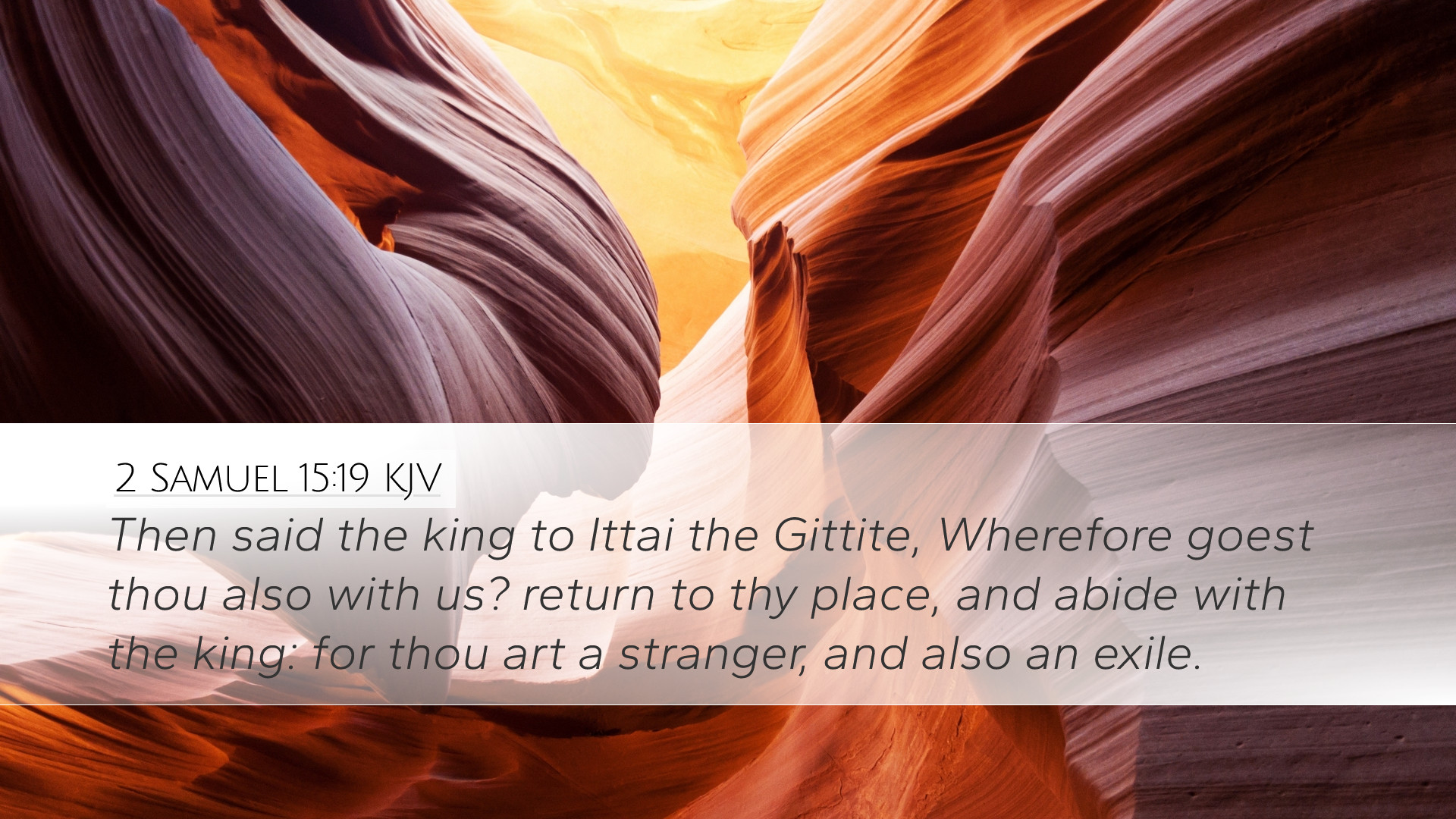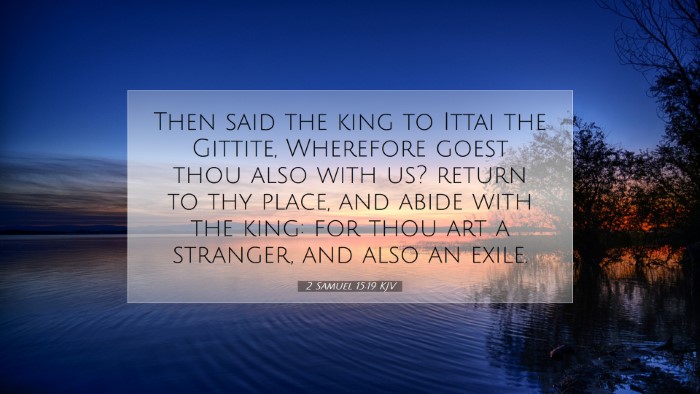Commentary on 2 Samuel 15:19
2 Samuel 15:19 states:
"But then said the king to Ittai the Gittite, 'Why goest thou also with us? return to thy place, and abide with the king; for thou art a stranger, and an exile.'"
Introduction
This verse occurs in a pivotal moment during David's flight from Jerusalem due to Absalom's rebellion. It signifies not only David's leadership and compassion but also underscores the nature of loyalty amidst turmoil. Several public domain commentaries provide insight into the layers of meaning contained within this simple yet profound verse.
Contextual Analysis
To fully grasp the significance of 2 Samuel 15:19, one must consider the surrounding events. King David, once an esteemed ruler, finds himself fleeing from his own son Absalom, whose insurrection has forced him to abandon his capital. In this precarious setting, the loyalty of those surrounding David is put to the test.
David’s Leadership
Matthew Henry emphasizes David's qualities as a leader, noting that even in distress, he did not lose sight of the well-being of those who accompanied him. Henry notes that his question to Ittai reflects not only a concern for Ittai's safety but also an understanding of his position as an outsider:
"David's concern for Ittai illustrates his compassionate leadership. Rather than demanding loyalty, he offers understanding and empowers Ittai to make his own choice."
The Significance of Ittai
Albert Barnes further elaborates on Ittai's background, identifying him as a Philistine, an exile who had chosen to align himself with David. Barnes points out that this moment highlights the nature of true allegiance, as Ittai, though a foreigner, had forsaken the security of his homeland to stand with David:
"Ittai’s loyalty, in contrast to the disloyalty of Absalom's followers, elevates the narrative, emphasizing that loyalty is borne out of character rather than nationality."
Rhetorical Questions and Decision-Making
Adam Clarke takes a closer look at David's rhetorical question: 'Why goest thou also with us?' Clarke suggests this serves a dual purpose: it acknowledges Ittai's loyalty while simultaneously presenting him an opportunity to reconsider his position in light of the turmoil:
"David's words offer Ittai a chance to withdraw without shame, reflecting the diplomacy required in leadership during crises. It displays David as a king who values both honor and friendship."
Theological Reflections
This verse invites deeper theological reflection on themes of loyalty, belonging, and the nature of true leadership, particularly in moments of crisis. For pastors, students, and theologians, these reflections can be pertinent in understanding congregational dynamics and the nature of faith in tumultuous times.
Loyalty and Belonging
Henry's commentary suggests that Ittai’s decision mirrors the choices faced by believers today: whether to remain loyal in challenging times or to seek safety in abandoning their commitments. This raises important questions about the nature of loyalty:
- What does it mean to remain loyal to God and His people amidst adversity?
- How does one navigate their faith in a world filled with trials and tribulations?
Leadership in Exile
Barnes' observations on the character of leadership resonate deeply within ecclesial contexts. The willingness to extend grace and understanding, especially to those who are new or marginalized, is crucial. This moment in David's life serves as a reminder for leaders to:
- Recognize the value of diverse backgrounds within their congregations.
- Offer guidance while respecting the autonomy of their followers.
Practical Applications
The insights derived from 2 Samuel 15:19 offer various practical applications for the contemporary church and its leaders:
- Creating an Inclusive Community: Just as David acknowledged Ittai’s unique situation, church leaders should strive to create environments that recognize and celebrate diversity.
- Encouraging Personal Agency: It is critical for leaders to empower their followers to make choices in their faith journey without coercion.
- Fostering Loyalty Through Compassion: Increasing loyalty within a congregation can often be achieved through acts of love and understanding.
Conclusion
In conclusion, 2 Samuel 15:19 encapsulates profound truths about leadership, loyalty, and the dynamics of belonging. The insights offered by public domain commentaries underscore the historical and theological significance of this text. For leaders today, the potential to foster a faithful community amidst external and internal trials lies in the embodiment of the virtues displayed by David and his relationship with Ittai. Understanding these principles not only prepares pastors and scholars for robust ministry but also enriches the collective faith experience of those they serve.


